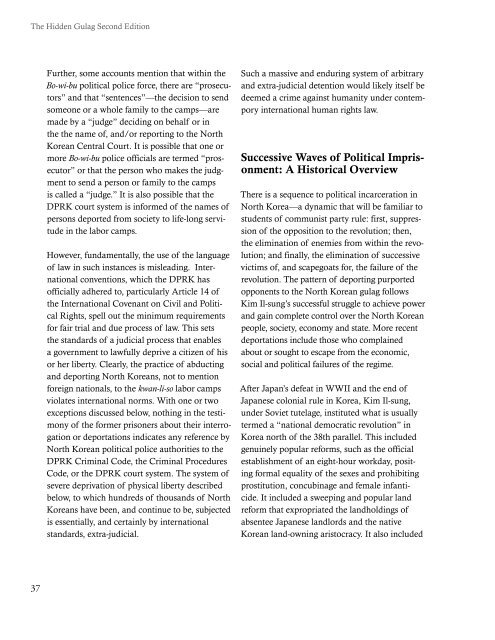The Hidden Gulag - US Committee for Human Rights in North Korea
The Hidden Gulag - US Committee for Human Rights in North Korea
The Hidden Gulag - US Committee for Human Rights in North Korea
Create successful ePaper yourself
Turn your PDF publications into a flip-book with our unique Google optimized e-Paper software.
<strong>The</strong> <strong>Hidden</strong> <strong>Gulag</strong> Second EditionFurther, some accounts mention that with<strong>in</strong> theBo-wi-bu political police <strong>for</strong>ce, there are “prosecutors”and that “sentences”—the decision to sendsomeone or a whole family to the camps—aremade by a “judge” decid<strong>in</strong>g on behalf or <strong>in</strong>the the name of, and/or report<strong>in</strong>g to the <strong>North</strong><strong>Korea</strong>n Central Court. It is possible that one ormore Bo-wi-bu police officials are termed “prosecutor”or that the person who makes the judgmentto send a person or family to the campsis called a “judge.” It is also possible that theDPRK court system is <strong>in</strong><strong>for</strong>med of the names ofpersons deported from society to life-long servitude<strong>in</strong> the labor camps.However, fundamentally, the use of the languageof law <strong>in</strong> such <strong>in</strong>stances is mislead<strong>in</strong>g. Internationalconventions, which the DPRK hasofficially adhered to, particularly Article 14 ofthe International Covenant on Civil and Political<strong>Rights</strong>, spell out the m<strong>in</strong>imum requirements<strong>for</strong> fair trial and due process of law. This setsthe standards of a judicial process that enablesa government to lawfully deprive a citizen of hisor her liberty. Clearly, the practice of abduct<strong>in</strong>gand deport<strong>in</strong>g <strong>North</strong> <strong>Korea</strong>ns, not to mention<strong>for</strong>eign nationals, to the kwan-li-so labor campsviolates <strong>in</strong>ternational norms. With one or twoexceptions discussed below, noth<strong>in</strong>g <strong>in</strong> the testimonyof the <strong>for</strong>mer prisoners about their <strong>in</strong>terrogationor deportations <strong>in</strong>dicates any reference by<strong>North</strong> <strong>Korea</strong>n political police authorities to theDPRK Crim<strong>in</strong>al Code, the Crim<strong>in</strong>al ProceduresCode, or the DPRK court system. <strong>The</strong> system ofsevere deprivation of physical liberty describedbelow, to which hundreds of thousands of <strong>North</strong><strong>Korea</strong>ns have been, and cont<strong>in</strong>ue to be, subjectedis essentially, and certa<strong>in</strong>ly by <strong>in</strong>ternationalstandards, extra-judicial.Such a massive and endur<strong>in</strong>g system of arbitraryand extra-judicial detention would likely itself bedeemed a crime aga<strong>in</strong>st humanity under contempory<strong>in</strong>ternational human rights law.Successive Waves of Political Imprisonment:A Historical Overview<strong>The</strong>re is a sequence to political <strong>in</strong>carceration <strong>in</strong><strong>North</strong> <strong>Korea</strong>—a dynamic that will be familiar tostudents of communist party rule: first, suppressionof the opposition to the revolution; then,the elim<strong>in</strong>ation of enemies from with<strong>in</strong> the revolution;and f<strong>in</strong>ally, the elim<strong>in</strong>ation of successivevictims of, and scapegoats <strong>for</strong>, the failure of therevolution. <strong>The</strong> pattern of deport<strong>in</strong>g purportedopponents to the <strong>North</strong> <strong>Korea</strong>n gulag followsKim Il-sung’s successful struggle to achieve powerand ga<strong>in</strong> complete control over the <strong>North</strong> <strong>Korea</strong>npeople, society, economy and state. More recentdeportations <strong>in</strong>clude those who compla<strong>in</strong>edabout or sought to escape from the economic,social and political failures of the regime.After Japan’s defeat <strong>in</strong> WWII and the end ofJapanese colonial rule <strong>in</strong> <strong>Korea</strong>, Kim Il-sung,under Soviet tutelage, <strong>in</strong>stituted what is usuallytermed a “national democratic revolution” <strong>in</strong><strong>Korea</strong> north of the 38th parallel. This <strong>in</strong>cludedgenu<strong>in</strong>ely popular re<strong>for</strong>ms, such as the officialestablishment of an eight-hour workday, posit<strong>in</strong>g<strong>for</strong>mal equality of the sexes and prohibit<strong>in</strong>gprostitution, concub<strong>in</strong>age and female <strong>in</strong>fanticide.It <strong>in</strong>cluded a sweep<strong>in</strong>g and popular landre<strong>for</strong>m that expropriated the landhold<strong>in</strong>gs ofabsentee Japanese landlords and the native<strong>Korea</strong>n land-own<strong>in</strong>g aristocracy. It also <strong>in</strong>cluded37



